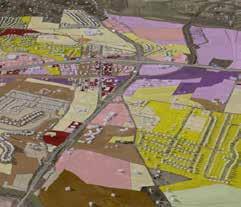
9 minute read
News From The Bench: Gross v. Parson, et al
FEATURE Review by Kenneth Heinz, Principal, Curtis, Heinz, Garrett & O'Keefe, P.C.
News From The Bench Ten Points Of Light: The Case of Gross v. Parson, et al.
Advertisement
If you have been struggling with ambiguities in the Sunshine Law over the past 40 years like me, this is a case to read. In a lengthy opinion and another concurring opinion, the Court of Appeals for the Western District of Missouri recently answered 10 questions that were presented by two Sunshine Law requests made to Governor Parson’s office.
Plaintiff Elad Gross sent the Sunshine requests in an attempt to find “dark money” contributions, i.e., anonymous campaign contributions made to circumvent campaign finance laws. Gross made two Sunshine Law requests. To the first request, the Governor’s Office (Office) responded that they would be able to provide a cost estimate within one month. About a month later, the Office sent Gross another letter stating they had found 13,659 documents and that the estimated cost to provide them would be $3,618.40. The Office asked for payment before they would prepare the information and stated that once they received that amount, it would take 120 business days to complete this request. An enclosed invoice estimated that research/processing would take 90.46 hours at the rate of $40 per hour. Gross then sent another letter to the Governor’s Office requesting records regarding the Office’s response to his first request. Several weeks later the Office responded to the second request with a set of 17 pages of documents with two pages partially redacted. A second set of documents consisted of 40 pages that were not redacted. No charge was made for these documents.
Gross then filed a petition in the Circuit Court of Cole County with eight counts. The Governor’s Office filed an answer and motion for judgment on the pleadings. The Circuit Court held a hearing and dismissed Gross’ petition. Gross appealed to the Western District of the Court of Appeals.
Gross asserted 10 points on appeal alleging a Circuit Court error in entering judgment in favor of the Governor’s Office. The Court addressed each seriatim.
Gross’ first point was that the Office acted arbitrarily in denying his request to waive or reduce fees. The Court found that Gross failed to properly raise a constitutional challenge on this issue.
In his second point, Gross claimed error in charging him attorney fees to access the public records. Since Gross requested both documents and electronic records, the Court addressed each separately. As to documents, Subsection 610.026.1(1)RSMo provided that fees may be assessed for “search, research and duplication time.” The Office argued that the subsection allows for attorney research time to determine whether unclassified documents were open or closed prior to disclosure. Therefore, the Office asserted that an attorney was required to perform research on attorney/client privilege and legal work product. The Court approved charging for attorney review so long as the charge is at the rate of the lowest paid attorney in the office. As to electronic documents, Subsection 2 of Section 610.026.1 allows fees to be charged for “providing access to public records maintained on computer facilities.” However, it limits the fees to “include only the cost of copies, staff time that shall not exceed the hourly rate of pay for staff.” The Court held that with respect to electronic records, it appeared that the person in charge of the search for documents received $19 per hour. Subsection 2 makes no express provision
Everything you need all in one place Powerful tools that work together
Minutes & Agendas Organize With Ease
Public Records Request Requests Made Easy
FAQ’ s App Handy & Convenient
Notification Center Simple Yet Powerful















Document Center Documents Done Right














E-Notify Keep Them Notified
We believe in...
Making government beautiful, accessible, and different. Our goal is to make our client’s websites truly beautiful. We have a cabinet full of awards that stand as a testament to our mastery of design. But functionality and navigability are also important components of a beautiful user experience. AsAs technologytechnology continuescontinues to evolve, governments must adapt and change the way they reach out to the individuals and companies who rely on them. This is why we continue to enhance our technology, regularly adding new features that enable our clients to most effectively serve their constituents and manage their website content.
OurOur inninnovative web design, cutting edge web content management system, and an ingenious suite of web apps go a long way toward allowing our municipal clients to be different by making a difference in people’s lives.
for research fees to be assessed to the requestor. The Court found no authority for assessing research or attorney fees to a request for electronic records under Subsection 2.
In his third point, Gross alleged the Governor’s Office violated the Sunshine Law by not providing him the earliest time the request for records would be available. The Office argued that it was sufficient to provide an estimate of 120 business days. Since Gross’ first Sunshine request asked the Office to notify him in advance of research or copying if the fees exceed $100, the Office could not provide an exact date that the records would be available. The court said the Office responded in the best way possible under the parameters set by Gross.
In his fourth point on appeal, Gross alleged error since the Office failed to provide a detailed explanation of why the request required 120 business days. The Court agreed with Gross that the Office had not provided a detailed explanation for the delay.
In his fifth point, Gross alleged that the Office impermissibly redacted portions of records provided to Gross. The Court again agreed with Gross and stated that the Office bears the burden to establish that the material could be redacted because of attorney/client privilege.
The sixth point was also related to the redactions. The Governor’s Office argued that Gross had the burden to request a review by a court in camera of the redacted materials. The Court disagreed and stated that the burden was on the Office to prove compliance with the Sunshine Law by requesting an in camera review of the redacted materials.
In points seven and eight, Gross alleged that the Court erred in dismissing his petition because he alleged a knowing violation of the Sunshine Law. The Court stated that Gross failed to plead that the Office had a duty to produce documents under the first request. The Court found that since Gross failed to pay the estimated costs, the Office did not have an obligation to provide the records. Waiving fees is discretionary. Therefore, there was not a knowing violation of the Sunshine Law. However, the Court found that Gross had properly pleaded a knowing violation to the second request.
On his ninth and 10th points, Gross argued that the redactions were improper and were a “purposeful” violation of the Sunshine Law. Gross alleged that the Office violated the Sunshine Law by purposely avoiding providing information that could affect the election of Governor Parson or Josh Hawley. The Court found that Gross’ Petition did not plead any facts to indicate the Office was aware that the redaction would delay Gross’ investigation or cause him to incur substantial costs pertaining to the second request. The Court denied points nine and 10.
In a concurring opinion, one judge disagreed with the majority on the issue of whether the Office could charge attorney fees with regard to producing records in electronic form. The judge stated that he felt that attorney work
Now is the time to build.
Missouri’s municipalities and utilities are reevaluating capital improvement plans to advance critical infrastructure projects. With historically low interest rates, the financial backing available today makes it an attractive time to build. Watch our webinar to discover which funding options can quickly advance projects at burnsmcd.com/MML920.

S®

could be charged but only at the average, hourly rate of pay of staff. He concurred, however with the other two judges in reversing the Circuit Court’s grant of judgment on the pleadings.
So what does a city make of all this? Gross informed me that the Office applied to be heard by the Supreme Court of Missouri. He is awaiting a ruling of that application. If granted, the Supreme Court may or may not agree with any of the rulings of the Western District. If not granted, the case becomes the law, at least in the Western District. As to the points on which the Court reversed, further rulings on remand would be needed by the Cole County Circuit Court.
What to do in the meantime? The safest course may be to follow the Western District ruling. Attorney fees can be charged for document review at the lowest attorney rate but not for electronic documents — for these only the rate of staff time for production. Redactions should be explained and perhaps examined in camera. Delays should be explained. Obviously, avoid “knowing” and “purposeful” violations.
Kenneth J. Heinz is a principal with Curtis, Heinz, Garrett & O’Keefe, P.C. He serves as general counsel for several communities. Heinz has been active as special counsel to many municipalities in Missouri and Illinois on municipal issues. He has delivered seminars to many public and private groups at the local and state level on municipal issues, such as municipal contracts, zoning and Sunshine Law. Contact the firm at 314-725-8788 or www. chgolaw.com.
ARCHITECTS DESTINATIONS PLANNERS

Creative. Effective. Innovative.

ST. LOUIS WWW.PGAV.COM KANSAS CITY










